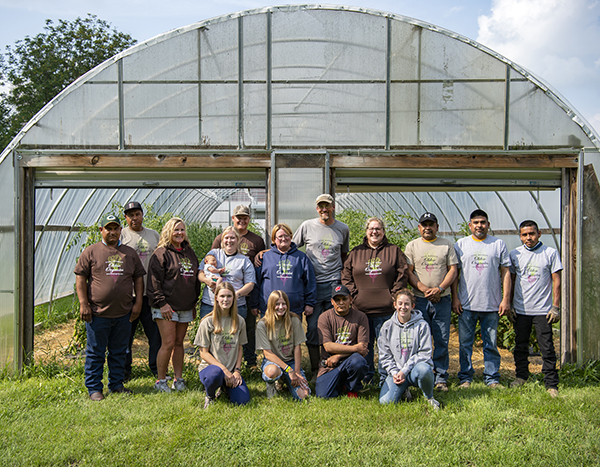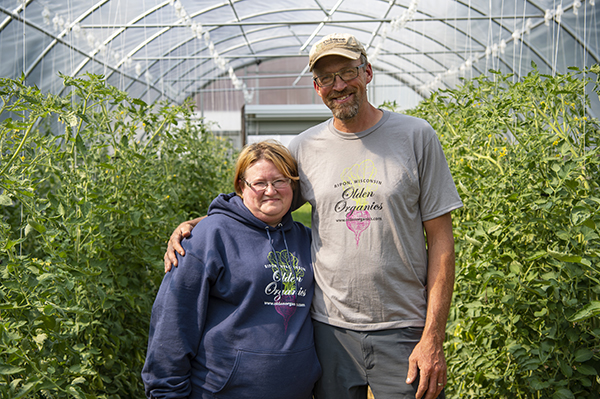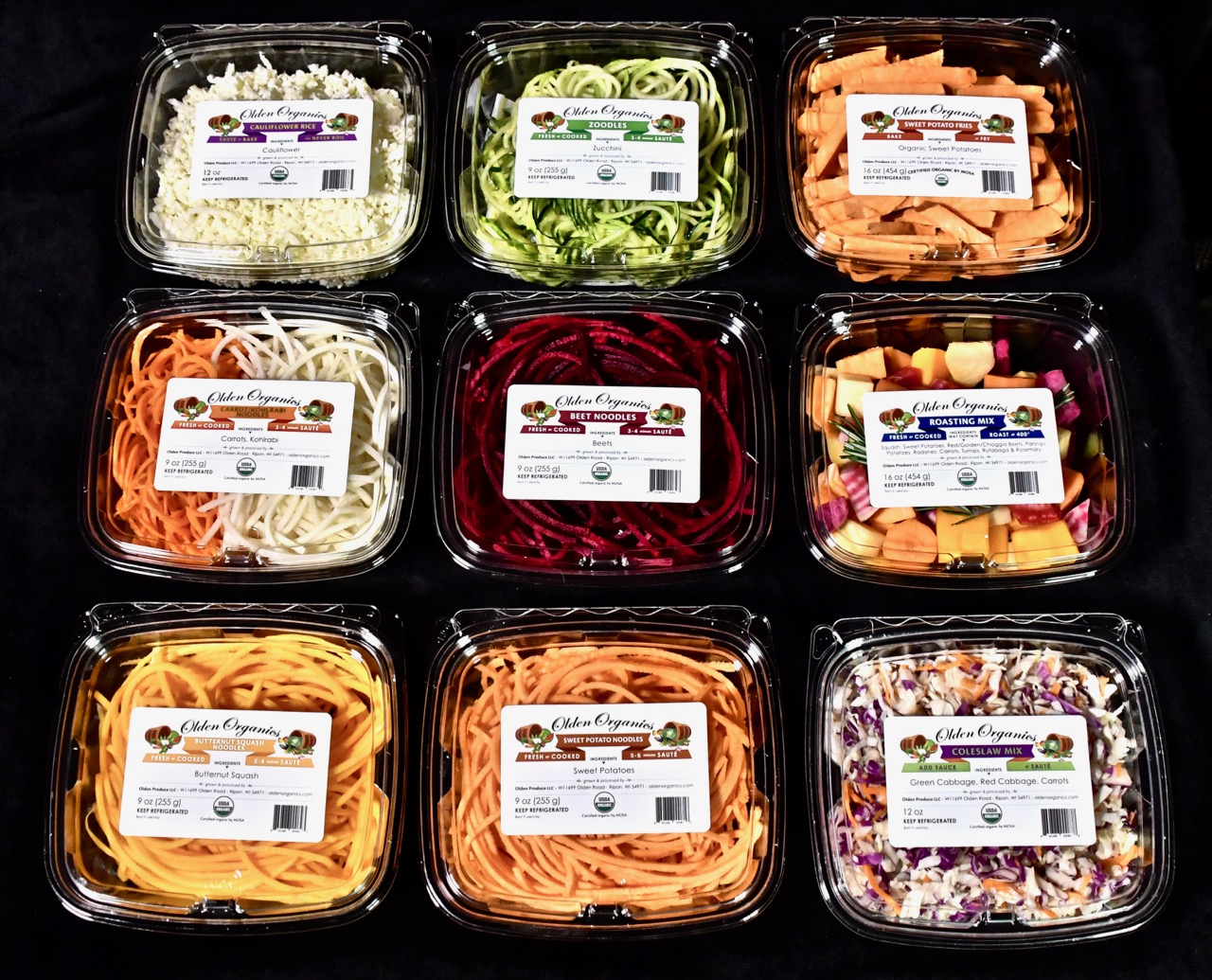by Micky Ellenbecker, Purchasing Assistant

Shortly after opening Willy West, the Produce departments started experimenting with more in-house pre-cut products, such as coleslaw and guacamole. Over the next five to six years we kept adding more and more offerings and making bigger and bigger batches, but it was a struggle to keep up with demand. We started bringing in pre-cut products from our produce distributors out of Minnesota, and that worked for a time, but it meant that we lost control of what products we had to choose from and what they were comprised of. It just so happens our growing pains in pre-cut produce ran side-by-side with a new organic production kitchen built by Tracy and Dick Vinz of Olden Organics in Ripon, Wisconsin. Our partnership started slowly, with just a handful of products, but one of the amazing aspects of working with the Vinzs is their willingness to use our recipes. Fast forward five years and they now make almost all our pre-cut veg and fruit offerings. When we started working with Olden Organics, we considered it a test run, but their commitment to produce the highest quality organic products for our customers has proven to be a wonderful partnership that we are very grateful for.
I reached out to Tracy recently to ask her more about their farm and their experiences being farmers. Tracy graciously agreed, and I’m happy to share more of Olden Organics story with you now.
Can you give us a brief history of your lives as farmers?
Our farm journey started 17 years ago. I quit my corporate job in marketing to start our farm. We started a small CSA with 17 members and did one farmers’ market each week. Each year after that we grew our CSA membership and added more markets. In 2011 Dick started on the farm full-time. In 2016 we became certified organic. Our wholesale sales had started to increase and even though we grew “organically” and were certified naturally grown, our grocery customers wanted us to become certified organic. In 2016 we put up our new pack shed and processing facility. That was the last year we offered CSA. In 2017 we hit the ground running with our line of cut vegetable products or “Veggie Creations” as we call them. We have always farmed at our current location. This farm has been in Dick’s family for over 110 years. We are the fourth generation to have the privilege to care for the land.
 How do you and Dick divide up the duties/tasks?
How do you and Dick divide up the duties/tasks?
In order to stay married, we very much split up the management of the farm. The germination of crops is managed by me and then, once the crops are planted in the fields or greenhouses, management is passed to Dick. The processing kitchen and wholesale orders are managed by me, and I also handle all “HR” duties. Dick manages soil health, crop rotation, pest and disease management, as well as our harvest crew. We both manage farmers’ markets and still personally attend them each week.
Did you always see yourselves as farmers or how’d you get into farming?
We never thought we would be farmers. I grew up in Green Bay, and my father was the farmers’ market manager for the city of Green Bay for 20 plus years. I spent Saturdays working for any produce vendor who needed help at the market. This is how I learned math and how to make change. Dick grew up spending as much time as possible with his grandfather Glenn. This is where he developed his love for nature and caring for plants. When we inherited our farm it seemed like our direction was provided for us.
What got you interested in starting your own processing kitchen?
Our processing kitchen was started because we were looking for something to do with our extra and “ugly” produce. We grew zucchini in 2015 on a large scale for a large grocery chain in the state and during that season the farm got hail. It was horrible to have to pick all the zucchini and donate as much as we physically could and compost the rest. We never wanted to be in a situation like that again. We knew in order to be profitable we had to come up with something that would turn our “seconds” into profit. We also wanted to provide year around work for employees and having the processing kitchen has provided that.
What percentage of the produce in your products is grown on your farm? And do you partner with other organic farms to supply you with produce?
We grow about 50-60 percent of the produce that is in our products. It varies each year depending upon the yields from our crops. We do partner with other organic farms in the state to supply us with produce as well. We work with Driftless Organics, Hill & Valley, Boerson Farm, and Park Ridge Organics, and we purchase through the Wisconsin Food Hub as well. We are also very proud of the fact that we have and still do employ fellow farmers in their off season. Danielle from Boerson Farm has worked in our processing kitchen when she has time in the winter months and Lori Redmond who co-owns Redmond’s Apple Basket Orchard has worked in our greenhouses and currently works in our processing kitchen in the winter/early spring.
What’s your favorite crop to grow?
My favorite crop to grow is tomatoes, and Dick’s favorite is melons.
What’s your favorite pre-cut product you produce in your kitchen?
My favorite pre-cut product is the sweet potato hash. We are huge sweet potato lovers and the hash is super easy to use in just about everything. I love it in chili, and sautéed with onions and peppers and added to omelets.
 What’s your biggest seller from your pre-cut line?
What’s your biggest seller from your pre-cut line?
Our best sellers are our coleslaw mix and guacamole. Willy Street Co-op brought both items to us and asked us to process them. The Guacamole is Willy Street Co-op’s very own Max Wilke’s recipe.
What is your biggest challenge as a farmer?
The biggest challenge as a farmer is labor. Now more than ever there is a shortage of people who want to work as hard and as much as farmers do. The 2021 season was the first year that the farm had a crew of H2A (a visa program for temporary agricultural workers) workers from Mexico. This made a huge difference in farm efficiency. We are working very hard to ensure we will be able to provide work for them year after year after year. These guys want to come to the U.S. to make a living for their families. They are very hard-working and caring individuals. We cannot imagine farming without them now.
Do you have any future changes planned for your farm?
We are currently in the design stages of our second pack shed/processing kitchen expansion. We need to increase the size of our processing kitchen and add another walk-in cooler just for finished product from the kitchen. We also need to add a loading dock and an additional walk-in cooler for the farm and additional dry storage. It was supposed to happen in 2021 but has been delayed until 2022. The farm is also getting a few horses to feed my love for them and also give our four Australian Shepherds something to herd besides us.
What was your dream job as a kid?
Dick’s dream job was to be a forest ranger and then changed to be an urban forester. He was the Village of Howard’s Forester from 1998–2003. My dream job was to raise horses. I did this for a few years from 1999-2002, and I now hope to get back into it on a much smaller scale to just cover the expenses of having them.









